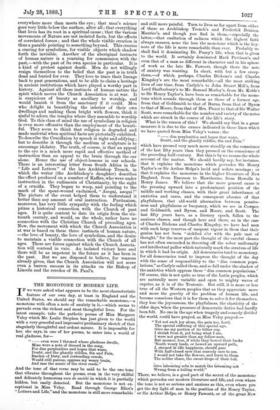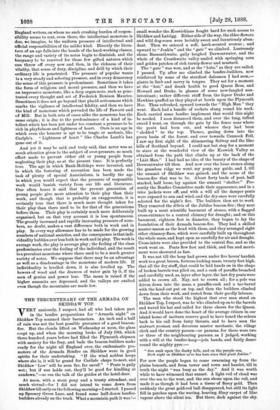THE MONOTONE IN MODERN LIFE.
IF we were asked what appears to be the most characteristic feature of our own day, at least in England and the 'United States, we should say the remarkable monotone,—a monotone with often a note of anxiety in it,—which seems to
pervade even the richest and most thoughtful lives. For the
latest example, take the pathetic poems of Miss Margaret Veley which Mr. Leslie Stephen has just given to the world with a very graceful and impressive-preliminary sketch of that singularly thoughtful and ardent nature. It is impossible for her, she says, in one of her poems, to enter into a world of real gladness, for- " — even were I throned where gladness dwells, Mine were a note of discord in the song, For dim perplexities and hopes that wane, Doubt, and the ghastly riddles, Sin and Pain, Burden of Duty, and contending creeds, Would still pursue, oppress my weary brain, And mar the music of the river reeds."
And the tone of that verse may be said to be the one tone that vibrates throughout the poems, even in the very skilful and delicately humorous vers de sociiie in which it is partially hidden, but easily detected. But the monotone is not ex- ceptional in Miss Veley. Read through George Eliot's " Letters and Life," and the monotone is still more remarkable
and still more painfuL Turn to lives as far apart from either of these as Archbishop Trench's and Frederick Denison Maurice's, and though you find in them,—especially the latter,—that exaltation of sadness which the highest faith always ensures, none the less the monotone which is the key- note of the life is more remarkable than ever. Probably we shall find it dominating Dr. Pusey's life, when that is given to the world. It certainly dominated Mark Pattison's, and even that of a man as different in character and in his sphere of work as the late Mr. Fawcett, though there the note of anxiety was wanting. In short, with but a few excep- tions,--of which, perhaps, Charles Dickens's and Charles Kingsley's are the most remarkable,—all the most striking lives of our time, from Carlyle's to John Stuart Mill's, from Lord Shaftesbury's to Mr. Samuel Morley's, from Mr. Keble's to Sir Henry Taylor's, have been as remarkable for the mono- tone which sounds through them as those of a former age, from that of Goldsmith to that of Barns, from that of Byron to that of Moore, from that of Mrs. Piozzi to that of Sir Walter Scott, were remarkable for the number and variety of the notes which are struck in the course of the life's story.
What is the reason of this ? We should say that in a great measure it is due to the causes indicated in those lines which we have quoted from Miss Veley's verses : the
" — dim perplexities and hopes that wane,
Doubt, and the ghastly riddles, Sin and Pain."
which have pressed very much more steadily on the conscience of the last fifty years than they pressed on the conscience of the preceding half-century. But this is by no means the whole account of the matter. We should hardly say, for instance, that it explains the monotone which pervades Sir Henry Taylor's or Sir Arthur Helps's lucid and sedate musings ; or that it explains the monotone in the higher literature of New England, from Emerson to Hawthorne, from Howells to Henry James. We believe that the more general cause is the pressing upward into a predominant position of the middle and working classes, with their great inheritanoe of anxieties and cares, and the consequent absence of that playfulness, that old-world alternation between pensive- ness and playfulness or buoyancy, which we see in Cowper, and Goldsmith, and Byron, and Moore, and Scott. The last fifty years have, as a literary epoch, fallen to the anxious classes, and though here and there, as in the case of Charles Dickens and Charles Kingsley, we have had men with such large reserves of unspent vigour in them that their genius has not been " sicklied o'er with the pale cast of thought," for the most part the thought of the careful classes
has not often succeeded in throwing off the sober uniformity and intellectual pallor which naturally mark the stratum of life in which it had its origin. All democracies tend to monotony, for all democracies tend to impress the thought of the day with the sense of responsibility to the " dim common popu- lations," as Carlyle called them, and so fall under the shadow of the anxieties which oppress these " dim common populations." Of course, this is not quite so true of the Latin peoples, which are naturally more variable and open to mighty waves of caprice, as it is of the Teutonic. But still, it is more or less true of all the Western peoples that as they appreciate more and more the gravity of the problem of human life, and become conscious that it is for them to solve it for themselves, they lose the joyousness, the playfulness, the elasticity of the older days, When the pressure of democratic duties had hardly been felt. No one in the age when tragedy and comedy divided the world, could have prayed, as Miss Veley prayed :—
" Yet not such joy alone, the pain too, Lord,
The special suffering of this special age, Give me my portion of its bitter cup. I shrink from it, yet being what I am, I were not greater than my fellow-men, But meaner, less, if while they bowed their backs 'Neath weary loads, or hewed an upward path, I, steeped in idle happiness, should gaze
With half-closed eyes that scarcely care to see.
I would not take the flowers, and leave to them The nobler share, the sweat-drops of their toil.
Give labouring sobs to match the labouring sob Wrung from a toiling world."
There, we believe, is a good part of the secret of the monotone
which pervades our modern literature and life, and even where the tone is not so serious and anxious as this, even where you get the dry light of men in the position of Sir Henry Taylor, or Sir Arthur Helps, or Henry Fawcett, or of the great New England writers, on whom no such crushing burden of respon- sibility seems to rest, even there, the intellectual monotone is due, we imagine, to the uniform pressure of intellectual and official responsibilities of the milder kind. Directly the litera- ture of an age falls into the hands of the hard-working classes, the range and variety of its notes begin to diminish, and the buoyancy to be reserved for those few gifted natures which can throw off every now and then, in the richness of their vitality, that sense of duty, discipline, and drill by which their ordinary life is penetrated. The pressure of popular wants is a very steady and sobering pressure, and in every democracy the sense of this pressure is predominant. Sometimes it takes the form of religious and moral pressure, and then we have an impressive monotone, like a deep organ-note, such as pene- trated every thought and act of Frederick Denison Maurice. Sometimes it does not go beyond that placid seriousness which marks the vigilance of intellectual fidelity, and then we have the kind of monotone which pervaded the life of Fawcett and of Mill. But in both sets of cases alike the monotone has the name origin ; it is due to the predominance of a kind of in- tellect which has been put under too constant a pressure to be rich in playfulness and lightness of heart. Ours is an age in which even the humour is apt to be tragic or sardonic, like Carlyle's. " Lightness of heart " like Charles Lamb's has gone out of it.
And yet it may be said, and truly said, that never was so much attention given to the subject of over-pressure, so much
effort made to prevent either old or young people from neglecting their play, as at the piesent time. It is perfectly true. The age in which Bank-Holidays were invented, and in which the fostering of recreation has been made the task of plenty of special Associations, is hardly the age in which you would expect that the pressure of responsible work would banish variety from our life and literature. 'One often hears it said that the present generation of young people give more attention to their play than their work, and though that is probably an exaggeration, it is certainly true that there is much more thought taken for their play than there used to be for that of the generations before them. Their play is certainly much more deliberately organised, but on that very account it is less spontaneous. 'The greatly increased and rapidly increasing pressure of num- bers, no doubt, makes a vast difference both in work and in play. In every way allowance has to be made for the growing numbers of national societies, and the consequence is that indi- viduality bubbles over less both in work and in play. The work is average work, the play is average play ; the feeling of the class predominates over the feeling of the individual, and the result is a prevalent monotone where there used to be a much greater variety of notes. We suppose that there may be an advantage as well as a disadvantage in the monotone of modern life. If individuality is levelled down, it is also levelled up. The hewers of wood and the drawers of water gain by it, if the men of genius and power lose. The mean is raised if the higher summits are depressed, and the valleys are exalted even though the mountains are made low.



































 Previous page
Previous page